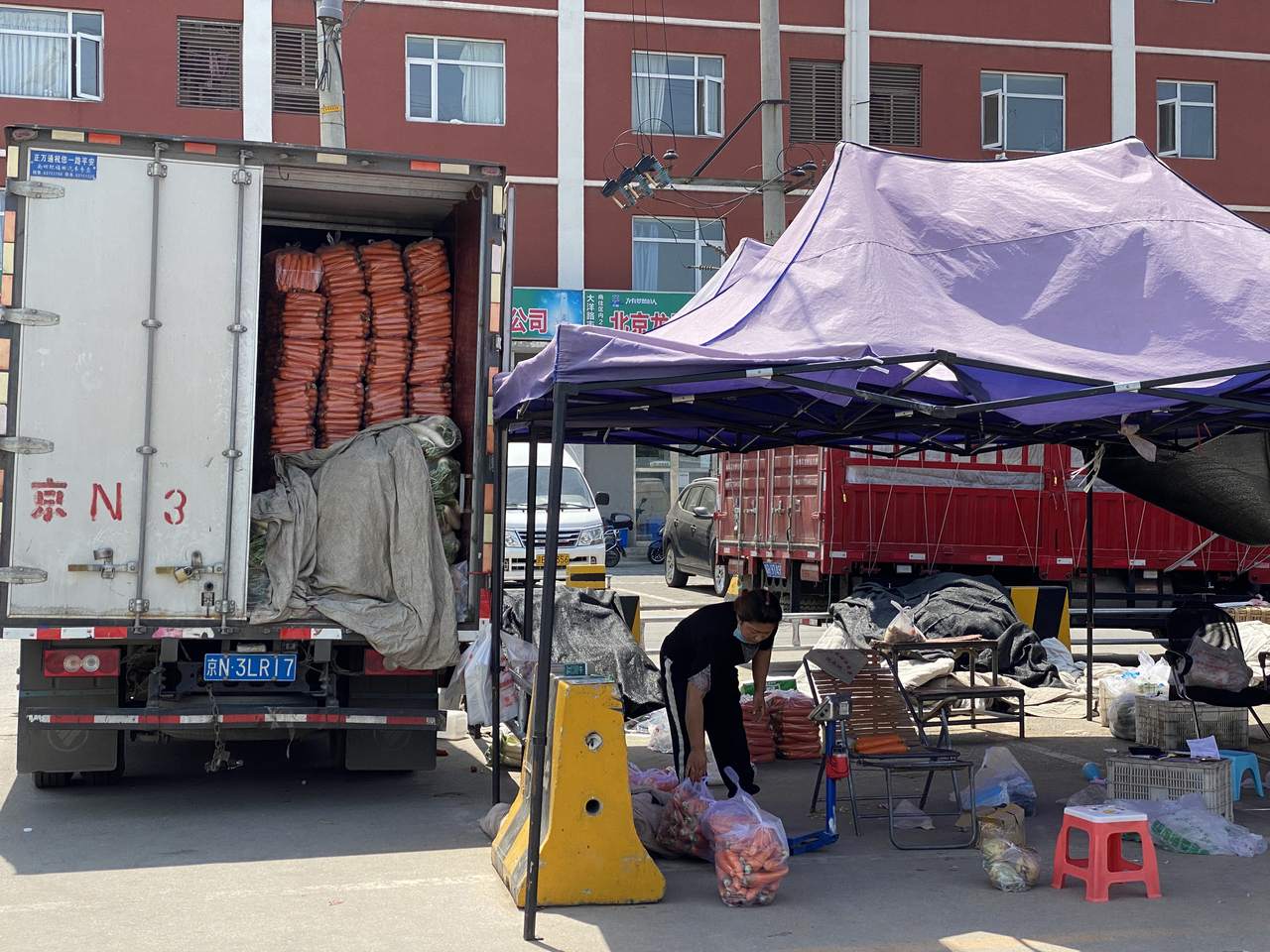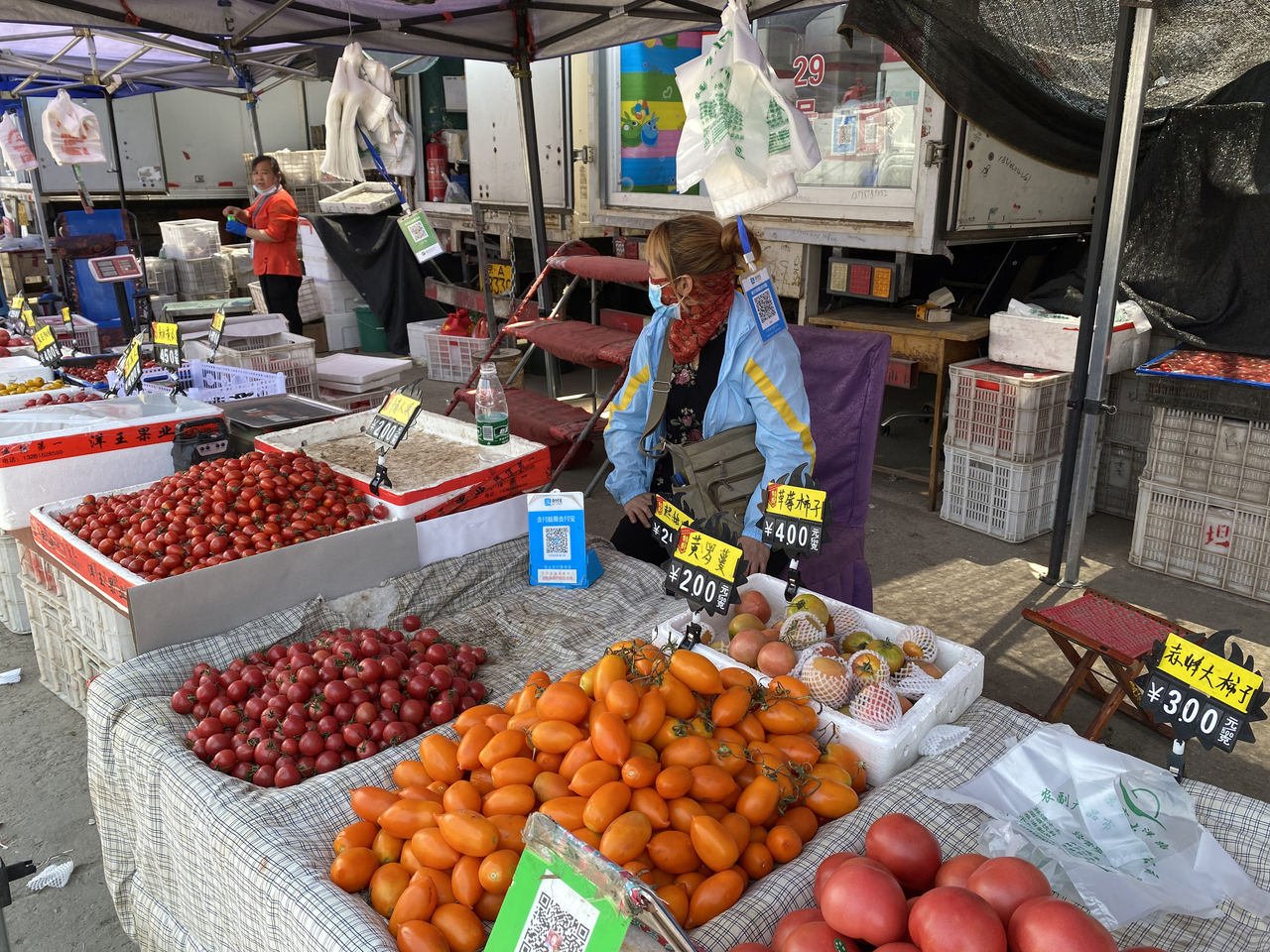Coronavirus: Beijing cleans all markets, eateries, tests vendors
Sign up now: Get insights on Asia's fast-moving developments

The Dayanglu market in Beijing on June 16, 2020.
ST PHOTO: ELIZABETH LAW
BEIJING - Just past noon at the Dayanglu Market southeast of Beijing, merchants were tossing vegetables back into giant container trucks and moving meat back into storage freezers, ahead of a mid-afternoon deadline when the market was scheduled to undergo thorough disinfection.
As more coronavirus cases linked to wholesale markets emerge in the capital, Beijing authorities have embarked on disinfection of the entire food supply chain and mass testing.
Since a coronavirus outbreak surfaced at a produce wholesale market in southwest Beijing, 11 similar facilities have been shut, with stallholders and workers made to undergo tests for the virus.
The market closures have raised questions about the city's food security, and authorities have been keen to keep Beijing fed by decentralising suppliers to smaller wholesale markets like Dayanglu. In a bid to alleviate fears about food safety, all markets will undergo deep cleaning and disinfection, while food handlers - from delivery truck drivers and produce sellers to restaurant workers - have also been ordered to undergo testing.
While Xinfadi and other larger markets remain shut, some suppliers are now shifting their produce to the 326,000sqm Dayanglu Market. The equivalent of about 45 football fields, the market is far smaller than the 1.12 million sqm Xinfadi.
Located in an industrial area which plays host to furniture, light fixture and alcohol wholesale centres, the usually bustling wholesale centre was noticeably empty when The Straits Times was there yesterday as stallholders got ready for the afternoon's disinfection.
City workers were headed to lunch, each carrying a white protective suit still in its plastic wrapping, goggles, shoe covers and gloves.
Tomato seller Ma Xiaoli, who was hawking produce under a tent in an open area, said health workers had swabbed her and other vegetable sellers earlier in the morning. But she had been allowed to continue manning her stall while awaiting the results of her test.
"Usually this entire area will be busy for the whole day, with cars, scooters and pickups everywhere but look at this," the 26-year-old Hebei native said, pointing to the empty car park. She had on a bandanna and a surgical mask over it.

elmarket - Scenes from the Dayanglu Market in southeast beijing on June 16, 2020. Vendors were shutting early to prepare for a market disinfection after over 100 coronavirus infections emerged at a similar wholesale centre in south beijing. Credit: Elizabeth Law
PHOTO: ST
Sellers were to pack up by 3pm, when health authorities would descend on the market to conduct what has been described as "thorough cleaning and disinfection".
Butchers still in the deserted meat section past 1pm were frantically trying to clear their stocks before the disinfection.
"I don't want water to get on my things and spoil them," said a mutton seller wrapping the electric components of a suspended fan in plastic.
Others were concerned about when the market, which operates round the clock, could reopen.
"I'm not even sure about coming back tomorrow," said beef seller Zhang Danni, making quick work of a rack of ribs for a waiting customer.
Most stalls around hers had shut before noon, shortly after they had been notified of the cleaning and nucleic acid testing.
She added: "My worry is if they find a case here, then all of us are in trouble."
But the seafood area, where vendors were the first to be tested for the virus, was already closed for cleaning yesterday. Workers dressed in full protective gear were misting disinfectant around empty fish tanks.
Since news broke that traces of the coronavirus had been found on a Xinfadi cutting board used for imported salmon, with government scientists saying on state television that the disease could have entered Beijing through imported produce, the city has gone into overdrive, pulling the fish off shelves while ordering restaurants not to sell it.
Customs officials in Beijing have stopped all salmon imports while Shanghai now requires each batch to be tested for Covid-19.
Some Beijing district councils have even gone a step further by saying restaurateurs cannot sell imported seafood, while others are barred from using locally bought seafood.
But World Health Organisation officials have put the theory on ice, saying on Monday that while the outbreak's origins are uncertain, the claim that it was caused by imports or the packaging of salmon was not the "primary hypothesis".
Japanese restaurants, which usually serve raw, imported fish, have been hit extra hard by the city's new line, just as many were starting to see business return to normal after months of coronavirus-linked sluggishness.
"Hopefully this blows over quickly and we can resume our imports soon, as it's quite difficult to run a business when so much of our items are imported," said the owner of a Japanese "izakaya" in the Dongcheng district of Beijing who declined to be named.
"At least we have other grilled or fried items to sell."


